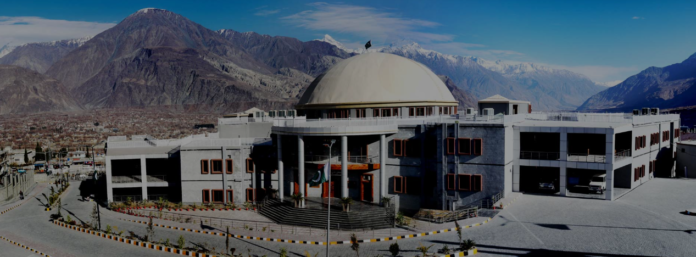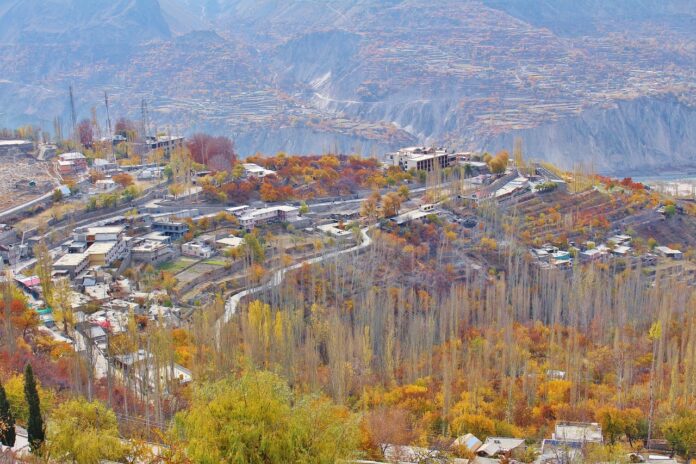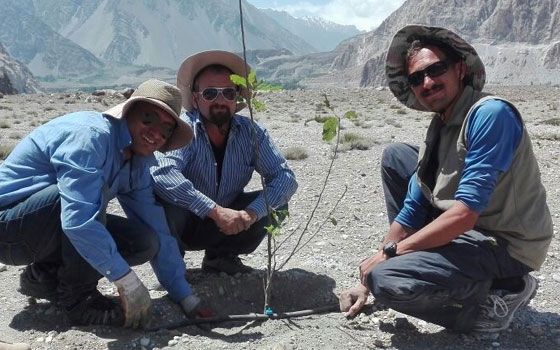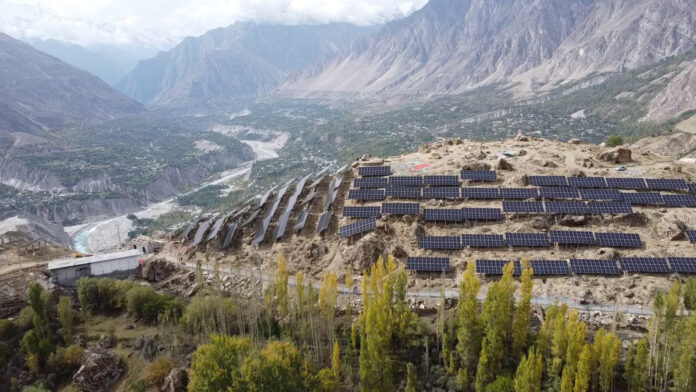The assembly is the most important and prestigious institution in any democratic system, established for legislation, resolving public issues, and overseeing government performance. The Gilgit-Baltistan Assembly was formed for these purposes and, after progressing through various stages, was named “Gilgit-Baltistan Assembly” in 2018 to present public issues on its platform and to enact serious and balanced legislation for their resolution. Unfortunately, at times, the environment in the Gilgit-Baltistan Assembly presents a scene that is entirely contrary to the spirit of democracy and the dignity of the assembly.
The disputes, insults, and uproar among elected representatives not only damage their credibility in the eyes of the public but also undermine the dignity of such an important forum. In today’s modern era, all disputes, fights, scuffles, insults, and uncivil behaviors of assembly members become video clips that spread across social media worldwide, ridiculing the assembly members and the entire Gilgit-Baltistan.
I have been observing the environment of the Gilgit Assembly for several years. Sometimes someone threatens to blow up the assembly, while another sings that the assembly will be locked. Such spectacles are witnessed in every session. In these circumstances, it would be appropriate to say, “Dear elders! This is an assembly, not a fish market!”
The primary purpose of the assembly is to deliberate on public issues, create laws, and review government performance. This forum guarantees that the representation of the public is done correctly and that appropriate legislation is enacted to resolve their issues. Some key objectives and responsibilities of the assembly are as follows:
Legislation:
Creating new laws for the improvement of the region and public welfare, and making necessary amendments to old laws.
Review of Government Policies:
Monitoring the performance of government projects and policies and providing suggestions for reforms.
Approval of the Budget:
Approving the budget for the proper use of public resources and overseeing its implementation.
Discussion on Public Issues:
The assembly discusses various public issues such as law and order, inflation, unemployment, and energy problems. The aim of these discussions is to highlight issues and propose effective measures for their resolution.
Accountability of Ministers:
The assembly questions ministers about their departments and holds them accountable to ensure better governance in the public interest.
Oversight of Administrative Matters:
The assembly monitors the performance of various government institutions and departments to ensure they fulfill their duties correctly and provide better services to the public.
Formation of National Policies:
The assembly formulates various policies necessary for the development of the country and province, such as industrial policy, educational policy, and agricultural policy.
Investigations and Committees:
The assembly conducts investigations into various issues through special committees, such as matters of corruption or the performance review of significant national projects.
Public Petitions and Complaints:
The assembly considers public petitions and complaints and takes steps to address them.
Additionally, there are many important tasks that assembly members must perform.
The dignity and sanctity of the assembly demand that its members adopt politeness, patience, and seriousness in their behavior. The public has elected them to be their voice and protect their rights, not to escalate personal disputes and political differences and turn the assembly into a battleground.
If assembly members disagree on a law, they have the full right to express their opinion, but this disagreement should be presented with politeness and reasoning. To maintain the dignity of the assembly, it is essential that every disagreement is heard with respect, and members should try to understand each other’s points instead of making personal attacks.
History has many examples where political leaders have demonstrated politeness and dignity despite their severe differences. For instance, there were clear ideological differences between Quaid-e-Azam Muhammad Ali Jinnah and Pandit Jawaharlal Nehru, but both leaders presented their disagreements politely and never resorted to personal attacks.
Another example is the British Parliament, where there are intense political differences between the ruling and opposition parties; however, a certain level of politeness and dignity is always maintained in the parliament. Members in the British Parliament present their views with seriousness and reasoning and allow others the right to be heard.
It is also essential for the Gilgit-Baltistan Assembly that members present their differences politely. When assembly members disagree on an issue, they should use reasoning and logic as their weapon; each member should present their case with arguments, not in an emotional and unserious manner.
Avoiding personal attacks is imperative. Disagreement should not turn into personal enmity. Every member should respect the personality of others, even if they are political opponents.
Patience and tolerance are also necessary. Demonstrating patience despite differences is crucial. Listening to and understanding a member’s opinion, even if one disagrees, is an important democratic principle.
I would like to present some suggestions for the restoration of the assembly’s dignity to the honorable members so that the dignity of this esteemed house is not diminished. After implementing these suggestions, it may be possible for this honorable house to maintain its effectiveness.
Training Workshops:
Organize training workshops for assembly members to inform them about the principles of legislation, parliamentary etiquette, and public service duties.
Disciplinary Laws:
Establish strict rules to maintain discipline in the assembly so that no member disrupts the session for personal interests. If rules already exist, they must be enforced.
Exemplary Leadership:
Assembly leaders must set an exemplary role to serve as a guiding light for other members. If leaders demonstrate politeness and seriousness, other members will follow suit. If key leaders contribute to a heated environment, members will also follow that trend.
Adherence to Code of Conduct:
Assembly members should strictly adhere to the code of conduct to ensure that assembly proceedings remain dignified and civilized. Respect for parliamentary etiquette is essential.
Ensuring Attendance:
Members should take their responsibilities seriously and regularly attend assembly meetings to play an effective role in discussions on important issues.
Constructive Debate:
Members should participate in constructive discussions, transcending political opposition, so that assembly decisions align with public welfare and contribute to national development.
Avoiding Unjustified Uproar:
To maintain the assembly’s dignity, members should avoid unnecessary uproar or disruption of assembly proceedings.
Focusing on Public Issues:
Members should prioritize public issues and national interest over personal or party interests in their speeches and actions.
Speaking Based on Information and Research:
Discussions in the assembly should be based on thorough research and information to ensure that debates are constructive and beneficial.
Mutual Respect and Cooperation:
Assembly members should respect one another and strive to resolve matters through mutual cooperation and dialogue, creating a pleasant and dignified assembly environment.
Transparency and Accountability:
Members should be accountable to the public regarding their performance and ensure transparency in their decisions and actions.
Education and Training:
Assembly members should pursue further education and training to improve parliamentary procedures and the legislative process so they can better fulfill their duties.
Positive Relations with Media:
Members should establish positive and constructive relationships with the media to effectively communicate the assembly’s performance and decisions to the public.
These few suggestions can help honorable assembly members not only to better fulfill their responsibilities but also to enhance the assembly’s dignity. It is hoped that these points will be taken seriously.
The assembly is a sacred and democratic institution, and its dignity and respect are the responsibility of every member. If insults, attacks, disputes, and uncivil behavior continue in the assembly, public trust in this institution will erode. The public expects their elected representatives to work seriously and politely to resolve their issues, not to escalate personal differences.
Honorable assembly members should remember that this is an assembly, not a fish market.
This is an assembly, not a fish market
Hunza Times Hotel Reservation & Bookings Cancellation and Refund Policy
Cancellation Policy:
- Cancellations can be made up to 7 days prior to the check-in date with a full refund.
- Cancellations made 6-3 days prior to check-in will incur a 50% cancellation fee.
- Cancellations made within 2 days of the check-in date will not be eligible for a refund.
- No-shows or early departures will not be eligible for a refund.
Refund Policy:
- Full refunds will be processed for cancellations made 7 or more days prior to the check-in date.
- Partial refunds of 50% will be provided for cancellations made 6-3 days prior to check-in.
- No refunds will be issued for cancellations made within 2 days of the check-in date or for no-shows/early departures.
- Refunds will be processed back to the original payment method used for the booking.
- Please allow 5-7 business days for refunds to be processed.
Exceptions:
- In the case of extenuating circumstances, such as medical emergencies or travel restrictions, the hotel may waive cancellation fees or provide a full refund at their discretion.
- Guests are advised to purchase travel insurance to cover unexpected events that may require cancellation.
This policy is subject to change, and guests are advised to review the current policy at the time of booking. If you have any questions or concerns, please contact our reservation team at : info@
Tags: best hotels hunza, cancellation policy, refund policy, Hunza Times, hotel reservations, travel planning, mountain tourism, Gilgit-Baltistan, best hotels in hunza, Top best hotels in hunza, hunza best hotels, hotels in karimabad hunza, hotels in Gilgit,hotels in Baltistan,hotels in Gilgit-Baltistan
Viral Video Unfairly Tarnishes Reputation of Shiskin Inn Resort and Hunza Region
On July 9, 2024, a video went viral on social media aiming to tarnish the reputation of a 3-star hotel named Shiskin Inn Resort located at Attabad Lake, along with casting a negative light on the Hunza region. The video showcased a hole in one of the hotel’s bathrooms. It’s important to note that this hole was part of ongoing construction work and was not intended to invade anyone’s privacy. The first floor of the hotel was open to guests, and the hole was meant for installing a sewerage pipe to the upper-floor bathroom, covered temporarily with two blocks for safety. Guests were already aware of the construction activities as they had seen it themselves.
A video was reportedly made by Asif, a guide from an unregistered tour company called Tourista Adventure based in Lahore, along with the owner Mehran. The video’s purpose seems to be to damage the reputation of both Hunza and a hotel. It’s speculated this was done to avoid paying a large hotel bill amounting to 488,000 rupees.
Under this company 113 guests had a stay at the hotel from July 1st to July 3rd and on 9th july some of them have publish video for personal interest.
The hotel owners are disappointed by the breach of trust by the tour company, which had brought guests to their hotel before. They are asking authorities to take action against those who spread false information.They believe this misinformation has harmed the hotel’s reputation and the beautiful Hunza region.
The incident grabbed the attention of journalists, but some of them reported on it without knowing all the facts. Now, there’s a call for the Gilgit-Baltistan government to get involved and take action against those who are responsible. This request stresses how important it is to protect small businesses from unfair criticism.



Revolutionizing Agricultural Water Management in the Hunza River Basin: Exploring the Potential of Solar Water Pumps
The Hunza River Basin in Gilgit-Baltistan faces significant challenges in agricultural water management, which directly impacts the livelihoods of the local communities and the sustainability of agricultural practices. This article delves into the pressing issue of water scarcity in the region and explores whether solar water pumps can serve as an alternative solution to address agricultural water management challenges.
Water Scarcity in the Hunza River Basin:
The Hunza River Basin is characterized by limited water resources, particularly during the dry seasons when agricultural activities heavily rely on irrigation. The traditional methods of water extraction, such as diesel or electric pumps, are often costly and unsustainable due to the region’s remote locations and inadequate access to electricity infrastructure. Consequently, farmers face significant obstacles in securing a reliable water supply for their crops, which hampers agricultural productivity and economic growth.
The Potential of Solar Water Pumps:
Solar water pumps have emerged as a promising alternative for agricultural water management in areas with limited access to grid electricity. By harnessing solar energy, these pumps utilize photovoltaic panels to power the water pumping systems. Solar water pumps offer several advantages over traditional pumps, including:
- Cost-Effectiveness: Solar water pumps eliminate the need for expensive diesel or electric power, resulting in reduced operating costs for farmers in the long run.
- Environmental Sustainability: Solar water pumps produce clean energy, reducing greenhouse gas emissions and minimizing the ecological footprint of agricultural activities. They align with sustainable agricultural practices and contribute to environmental preservation.
- Reliability and Independence: Solar water pumps provide a reliable and consistent water supply, as they are not dependent on grid electricity. This ensures uninterrupted irrigation for farmers, even in remote areas where electricity infrastructure is limited.
- Low Maintenance: Solar water pumps have fewer moving parts compared to traditional pumps, resulting in reduced maintenance requirements and costs. This makes them well-suited for remote and harsh environments like the Hunza River Basin.
Challenges and Considerations:
While solar water pumps offer significant potential, their implementation in the Hunza River Basin faces certain challenges and considerations. These include:
- Initial Investment: The upfront cost of installing solar water pumps may pose a financial barrier for small-scale farmers. However, various government subsidies, grants, and financing options are available to support the adoption of renewable energy technologies.
- Technical Expertise: Adequate technical know-how and training are essential for the successful installation, operation, and maintenance of solar water pump systems. Capacity-building initiatives and training programs can help farmers navigate this aspect effectively.
- Water Demand and Efficiency: Proper water management practices, including efficient irrigation techniques and water conservation measures, need to be implemented alongside solar water pumps to optimize water usage and enhance agricultural productivity.
- Integration with Existing Systems: Integration of solar water pumps into the existing agricultural water management infrastructure, such as canal networks and storage systems, should be carefully planned and executed to ensure seamless operation and maximize benefits.
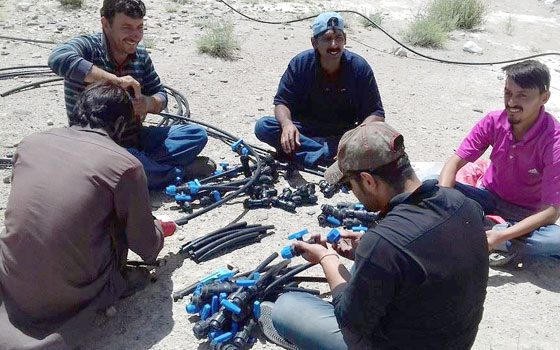
The adoption of solar water pumps presents a promising opportunity to address agricultural water management challenges in the Hunza River Basin. By harnessing clean and sustainable solar energy, these pumps can provide reliable and cost-effective irrigation solutions for farmers while reducing the environmental impact of agricultural practices. However, careful planning, investment support, technical capacity-building, and efficient water management strategies are crucial for the successful implementation and integration of solar water pumps. With concerted efforts and collaboration, the agricultural sector in the Hunza River Basin can embark on a path of enhanced water sustainability, increased agricultural productivity, and improved livelihoods for the local communities.
Empowering Hunza: The Remarkable Journey of a 1MW Solar Power Plant for Uninterrupted Power Supply
In the picturesque region of Hunza, nestled amidst the majestic mountains of Gilgit-Baltistan, a groundbreaking initiative has taken place that goes beyond sustainability and sets a new standard for environmental-friendly energy solutions. The installation of a 1MW solar power plant has not only transformed the lives of the local residents but has also become a shining example of renewable energy’s potential to create a brighter and greener future. This article delves into the remarkable journey of this solar power plant and its profound impact on the Hunza community.
Harnessing the Power of the Sun:
Located at an elevation of 2,800 meters above sea level, the 1MW solar power plant stands as a testament to human ingenuity and the untapped potential of solar energy. Equipped with over 2,300 state-of-the-art solar panels, this innovative facility has become the backbone of uninterrupted power supply in Hunza. By harnessing the abundant sunlight that graces the region, the plant generates an impressive 1,600 megawatt-hours of electricity annually, catering to the energy needs of local households and industries in the valleys.
Addressing the Energy Deficit:
Prior to the installation of the solar power plant, Hunza faced significant challenges in meeting its energy demands. The region frequently experienced power outages and relied heavily on conventional energy sources, which not only posed environmental risks but also hindered the socio-economic progress of the community. Recognizing the need for a sustainable solution, the Special Investment Facilitation Council (SIFC), in collaboration with NPAK Energy, took a bold step towards transforming the energy landscape of Hunza.
Uninterrupted Power Supply:
One of the most remarkable aspects of the 1MW solar power plant is its ability to provide uninterrupted power supply to the residents of Hunza. With its advanced technology and efficient energy storage systems, the plant ensures a constant and reliable flow of electricity, even during periods of low sunlight or inclement weather conditions. This uninterrupted power supply has had a profound impact on various aspects of life in Hunza, ranging from improved healthcare services to enhanced educational opportunities and thriving local businesses.
A Greener and Sustainable Future:
The installation of the solar power plant in Hunza goes beyond mere energy production. It symbolizes a collective commitment towards building a greener and more sustainable future. By reducing the region’s dependence on fossil fuels and mitigating greenhouse gas emissions, this renewable energy project contributes significantly to combating climate change and preserving the pristine natural beauty of the area. It sets an inspiring example for other regions to follow, highlighting the transformative potential of solar energy.
Community Empowerment and Economic Growth:
The 1MW solar power plant has not only brought about environmental benefits but has also played a crucial role in empowering the local community and fostering economic growth. The availability of uninterrupted electricity has facilitated the establishment and expansion of local businesses, creating employment opportunities and boosting the region’s economy. Additionally, the surplus energy generated by the plant has the potential to be integrated into the national grid, further contributing to Pakistan’s overall energy security.
The installation of the 1MW solar power plant in Hunza represents a monumental step towards a sustainable and environmentally friendly future. Beyond providing uninterrupted power supply, this remarkable initiative showcases the immense potential of renewable energy sources to transform lives and communities. Hunza stands as a shining example of how innovation, collaboration, and a shared vision can create a brighter and greener world for generations to come. As we continue to harness the power of the sun, let the story of Hunza’s solar power plant serve as a beacon of hope and inspiration for a more sustainable future.
Revolutionizing Tourism: The Synergy Between AI and the Hunza Valley
The picturesque Hunza Valley, nestled amidst the mighty Karakoram mountain range in Pakistan, has long captivated the hearts of travelers with its breathtaking beauty and rich cultural heritage. In recent years, the integration of Artificial Intelligence (AI) into the tourism industry has revolutionized the way visitors experience this enchanting destination. By leveraging AI technologies, the Hunza Valley has enhanced its tourism offerings, creating a seamless and personalized experience for travelers from around the globe.
Enhancing Travel Planning:
AI has transformed the way tourists plan their trips to the Hunza Valley. By analyzing vast amounts of data, including historical visitor patterns, accommodation preferences, and local attractions, AI-powered platforms can provide personalized recommendations tailored to individual travelers’ preferences. These platforms consider factors such as travel dates, budget constraints, and interests to curate customized itineraries, ensuring that visitors make the most of their time in the valley.
Smart Destination Management:
AI has played a pivotal role in optimizing the management of the Hunza Valley as a tourist destination. Intelligent systems can monitor tourist footfall, traffic patterns, and environmental conditions in real-time. This data-driven approach enables efficient crowd management, allowing authorities to identify peak visiting hours, allocate resources effectively, and ensure a smooth flow of visitors in popular areas. AI-powered analytics also aid in identifying areas that require infrastructure development or conservation efforts to maintain the delicate balance between tourism and environmental sustainability.
Virtual Assistants and Chatbots:
AI-powered virtual assistants and chatbots have emerged as valuable tools for enhancing the visitor experience in the Hunza Valley. These intelligent interfaces can interact with tourists, providing instant information and guidance on local attractions, cultural events, and transportation options. Travelers can access this information through mobile applications, websites, or voice-activated devices, allowing them to navigate the valley with ease, even in unfamiliar surroundings.
Language Translation and Cultural Exchange:
Language barriers often pose challenges for tourists in foreign destinations. However, AI-driven language translation tools have bridged this gap in the Hunza Valley. Travelers can communicate effortlessly with locals, fostering a deeper cultural exchange and enabling a more immersive experience. AI-powered translation apps and devices facilitate real-time language translation, ensuring effective communication between visitors and the local community.
Smart Safety and Security:
Ensuring the safety and security of tourists is paramount in any destination. AI-based surveillance systems equipped with facial recognition technology can enhance security measures in the Hunza Valley. These systems can detect and alert authorities about potential threats or suspicious activities, enabling prompt intervention. Additionally, AI-powered analytics can monitor weather conditions, geological factors, and other risk factors, providing early warnings and ensuring the well-being of visitors.
The integration of AI into the tourism industry has ushered in a new era of unparalleled convenience, personalization, and safety for travelers visiting the Hunza Valley. From intelligent travel planning to virtual assistants, language translation, and smart security, AI technologies have transformed the way tourists engage with the destination. As the Hunza Valley continues to embrace the potential of AI, it is poised to remain a premier global destination, offering an unforgettable experience that seamlessly blends natural beauty, cultural heritage, and cutting-edge technology.
Pakistan Elections 2024: Democracy Betrayed
The recent Pakistan elections held on February 8th and 9th, 2024, were marred by controversy and allegations of electoral misconduct. The results of the second day of voting dramatically shifted in favor of the Pakistan Muslim League-Nawaz (PMLN), with accusations of interference by the bureaucracy and the Pakistan Army. This flagrant violation of democratic principles undermined the importance of the votes cast by Pakistani citizens, as the will of the people was disregarded in favor of political maneuvering.
The Manipulation of Results:
On February 8th, the initial election results indicated a clear victory for the Pakistan Tehreek-e-Insaf (PTI) party, with over 170 seats in the National Assembly. However, on February 9th, a sudden and unexpected change occurred, favoring the PMLN and its leader, Nawaz Sharif, to become the Prime Minister. It was widely speculated that the bureaucracy, with the assistance of the Pakistan Army, played a significant role in orchestrating this shift, effectively disregarding the democratic process.
Suppression of Opposition:
Leading up to the elections, PTI faced numerous obstacles. The party and its leader, Imran Khan, were unjustly targeted and faced false charges, resulting in Khan’s imprisonment. PTI was banned from participating in the election campaign, and their voice was silenced. Despite these challenges, Imran Khan and his party persevered and participated in the elections as independent candidates, driven by the hope of bringing positive change to the country.
Election Corruption and International Condemnation:
The elections were plagued by allegations of widespread corruption, with votes being stolen by the PMLN, often in collusion with the Pakistani Army and bureaucracy. This blatant manipulation of the electoral process not only undermined the democratic principles cherished by Pakistani citizens but also drew severe criticism from the international community. Countries such as the United States, Europe, and Australia expressed their concerns and called for strict action against those responsible for undermining the integrity of the elections.
The Impact on Pakistan’s Reputation:
The unfairness and lack of transparency during the elections have tarnished Pakistan’s reputation on the global stage. The international community views the interference by the Pakistani Army as a direct affront to democratic values. Pakistan’s commitment to democracy has been called into question, jeopardizing its standing and credibility with other nations.
Confession of Corruption:
In a surprising turn of events, on February 17th, the Commissioner of Rawalpindi openly admitted to his involvement in altering the election results. He confessed to changing winning votes into losing votes, resulting in a difference of 70,000 votes. He publicly named the Supreme Court judge and election commission officers allegedly complicit in the corruption. Following his confession, he resigned from his position and surrendered himself to the police, shedding light on the extent of the election manipulation.
Imran Khan: The Beacon of Hope:
Despite the widespread corruption and attempts to suppress PTI’s influence, the Pakistani people demonstrated their unwavering support for Imran Khan and his vision for a corruption-free Pakistan. Imran Khan remains the beacon of hope for citizens seeking genuine change and an end to the rampant corruption that plagues the country’s political landscape.
The 2024 Pakistan elections have exposed the dark underbelly of corruption and the violation of democratic principles. The manipulation of results, suppression of opposition, and international condemnation have cast a shadow on Pakistan’s democratic progress. However, the confession of corruption and the continued support for Imran Khan and PTI highlight the resilience of the Pakistani people and their determination to bring about positive change in their country.
Hunza Water Wine: A Captivating Blend of Tradition and Tourism
Hunza Valley, nestled in the awe-inspiring Karakoram mountain range of Pakistan, is renowned for its breathtaking beauty, rich cultural heritage, and warm hospitality. While the valley has long been a popular destination for adventure seekers and nature enthusiasts, it is also gaining recognition for a unique local beverage known as “Hunza Water Wine.” Combining the essence of tradition, touristic appeal, and an open-minded environment, Hunza Water Wine has become a symbol of the valley’s inclusive and welcoming spirit.
Preserving Tradition:
Hunza Water Wine, locally known as “Cherry Wine,” has deep roots in the valley’s history and cultural heritage. It is made from the succulent cherries that thrive in the region’s fertile orchards. The traditional winemaking process involves fermenting the cherries in clay pots, allowing the natural sugars to convert into alcohol over time. This centuries-old method has been passed down through generations, preserving the cultural legacy of the valley.
Touristic Attraction:
Hunza Water Wine has emerged as a unique attraction for tourists visiting the region. Travelers are drawn to the opportunity to taste a distinct local beverage, immersing themselves in the authentic flavors of Hunza. The winemaking process has become a fascinating spectacle, with visitors witnessing the meticulous preparation and fermentation stages. Additionally, local wineries offer guided tours and tasting sessions, providing an enriching experience that combines cultural exploration with culinary delight.
Global Secular Area:
Hunza Valley has gained recognition as a global secular area, where diverse cultures and religions coexist harmoniously. In this context, Hunza Water Wine symbolizes the valley’s open-mindedness and acceptance of different perspectives. It serves as a unifying element, bringing together people from various backgrounds to celebrate the region’s cultural heritage. Visitors to the valley are warmly welcomed to partake in the wine’s consumption, fostering a sense of inclusivity and camaraderie.
Open-Minded Environment:
The availability and acceptance of Hunza Water Wine reflect the liberal and open-minded environment in Hunza Valley. The locals embrace a progressive mindset, encouraging dialogue and exchange of ideas. This atmosphere of openness extends beyond the realm of winemaking, creating a space for intellectual discourse, artistic expression, and cultural appreciation. Visitors to Hunza Valley are invited to engage with the vibrant local community, fostering a sense of mutual respect and understanding.
Hunza Water Wine stands as a testament to the unique blend of tradition, touristic attraction, and open-mindedness that characterizes Hunza Valley. Its significance extends beyond its taste and cultural roots, embodying the valley’s ethos of inclusivity and global secularism. As travelers continue to seek authentic and enriching experiences, the allure of Hunza Water Wine adds yet another layer of fascination to the remarkable tapestry of Hunza Valley, making it a must-visit destination for those in pursuit of cultural immersion and natural beauty.
The 2024 Elections in Pakistan and the Future of PTI
The year 2024 holds immense significance for Pakistan as it approaches another round of general elections. The political landscape is buzzing with anticipation and speculation as citizens eagerly await the opportunity to exercise their right to vote. One party that has garnered substantial attention and shaped the country’s political discourse is the Pakistan Tehreek-e-Insaf (PTI). This article explores the upcoming elections and the potential future of PTI in Pakistani politics.
PTI’s Journey:
The PTI, founded by Imran Khan in 1996, emerged as a political force challenging the traditional powerhouses in Pakistani politics. After years of relentless campaigning and advocating for change, PTI achieved a historic victory in the 2018 general elections, forming the federal government and gaining control of multiple provincial assemblies.
Performance and Challenges:
Since assuming power, the PTI government has faced a myriad of challenges. Governing a diverse and complex nation like Pakistan requires tackling deeply entrenched issues, including economic stability, social reforms, governance, and security. The party has made efforts to address these challenges through initiatives such as the Ehsaas Program, focusing on poverty alleviation, and the Clean and Green Pakistan campaign, promoting environmental sustainability.
Election Promises and Achievements:
The PTI came into power with a comprehensive agenda, promising reforms in various sectors. While progress has been made in certain areas, such as the introduction of anti-corruption measures and institutional reforms, there have been criticisms regarding the pace and effectiveness of implementation. The party’s ability to deliver on its promises will undoubtedly play a crucial role in shaping its future prospects.
Public Perception and Support:
The success of any political party depends on the public’s perception and support. PTI’s popularity among the masses has experienced fluctuations over time, influenced by factors such as economic conditions, governance issues, and public expectations. The upcoming elections in 2024 will be a litmus test for PTI’s ability to retain its support base and appeal to new voters.
Challenges and Opportunities in 2024:
As Pakistan gears up for the 2024 elections, PTI faces both challenges and opportunities. The party will need to address concerns regarding economic stability, job creation, social welfare, and good governance. It will also need to navigate the complexities of coalition-building and managing alliances to secure a majority in the National Assembly and provincial assemblies.
Future Outlook:
The future of PTI will depend on its ability to learn from past experiences, adapt to evolving political dynamics, and deliver on its promises. The party’s leadership, including Prime Minister Imran Khan, will play a pivotal role in shaping its trajectory. Additionally, effective communication, transparency, and inclusive policies will be key factors in winning public trust and securing electoral success.
Conclusion:
The 2024 elections in Pakistan will be a crucial juncture for PTI and its future in Pakistani politics. Balancing the aspirations of the electorate, addressing pressing issues, and delivering on promises will be vital for the party’s longevity and sustainability. As Pakistan’s democratic process unfolds, it is the collective decision of the citizens that will shape the nation’s political landscape and determine the trajectory of PTI in the years to come.
Case Report: Challenging Experiences of Third Country Individuals in European Seasonal Agriculture Jobs
In this case report, we examine the experiences of a third country individual who applied for a seasonal agriculture job in Denmark. The individual, residing in Hungary, pursued this opportunity as part of their studies and signed a job agreement with a Danish farmer who owned a small agricultural farming company. However, the individual encountered various challenges throughout the visa application process, resulting in financial loss and disappointment.
Case Description:
The individual initially applied for an internship work permit online through the official website of the Danish immigration authorities. They paid a substantial amount for this permit, considering their student status and limited financial resources. Subsequently, they proceeded to the Vienna embassy to apply for the visa, where they again paid a significant fee. It was a considerable financial burden for the individual to bear, given their circumstances.
After a month of waiting, the prospective host employer contacted the individual, expressing their inability to handle the extensive questioning from the immigration authorities. As a farmer, the employer felt ill-equipped to address the inquiries satisfactorily. Consequently, the employer regretfully informed the individual about the authorities’ concerns, leading to the termination of the job offer.
The individual found themselves in a distressing situation, having already invested a substantial amount of money in the visa application process. This setback was particularly disheartening, considering the challenging circumstances of the COVID-19 pandemic. Additionally, the immigration authorities questioned the employer’s decision to hire a third country national, suggesting they should prioritize hiring Europeans, EEA citizens, or neighboring country residents. Such complex queries required legal expertise to address adequately, beyond the capacity of an ordinary farmer. Unfortunately, the individual’s personal economy suffered greatly, while the local economy thrived.
Discussion:
This case highlights several issues faced by third country individuals seeking employment opportunities in European countries, specifically in seasonal agriculture jobs. The individual expresses their concerns about the visa application process, emphasizing the need for clear communication regarding eligibility criteria. They suggest that immigration authorities should only advertise visa options on their websites for EU and EEA nations to prevent individuals from needlessly wasting their financial resources.
This case report sheds light on the personal and financial struggles faced by the individual during their pursuit of a seasonal agriculture job in Denmark. The dreams and aspirations of this hardworking student were dashed as a result of bureaucratic challenges and the limitations of their prospective employer, who lacked the necessary expertise to navigate the complexities of the immigration system. This unfortunate experience not only impacted the individual’s personal economy but also highlights the need for fair and transparent policies that do not discriminate based on nationality.
The case of this third country individual serves as a poignant example of the hurdles faced by aspiring workers seeking seasonal agriculture jobs in Europe. It underscores the importance of transparent communication, fair treatment, and non-discriminatory practices in the visa application process. By addressing these concerns, European countries can foster an environment that values diversity and equal opportunities for all individuals, regardless of their nationality.

